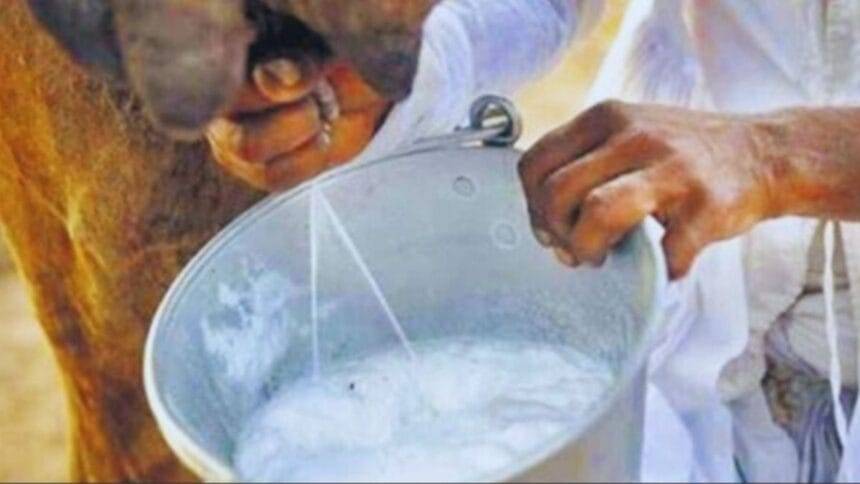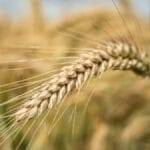Main Points In Hindi (मुख्य बातें – हिंदी में)
-
औषधीय गुण: ऊंट का दूध कई गंभीर बीमारियों जैसे मधुमेह, टीबी, और ऑटिज़्म के इलाज में सहायक होता है। इसके उच्च इंसुलिन स्तर के कारण, यह प्रकार-1 मधुमेह के प्रबंधन में प्रभावी माना जाता है।
-
वाणिज्यिक महत्व: ऊंट का दूध तेजी से देश भर में और विदेशों में मांग में है। भारत सरकार ऊंटों की घटती संख्या को रोकने के लिए इसके व्यापार को बढ़ावा दे रही है।
-
उत्पादों का निर्माण: ऊंट के दूध से विभिन्न डेयरी उत्पाद जैसे पनीर, आइसक्रीम, और मिठाइयाँ बनाई जा रही हैं। बीकानेर में इसके उत्पादन की तकनीकों की ट्रेनिंग भी दी जा रही है।
-
संरक्षण और प्रशिक्षण: Camel Research Center द्वारा लोगों को यह बताया जा रहा है कि ऊंट का दूध पचन के लिए लाभकारी है, और इसके सही उपयोग के लिए प्रशिक्षण भी दिया जा रहा है।
- सुरक्षा और उपयोगिता: ऊंट का दूध बच्चों के लिए सुरक्षित है, खासकर उन लोगों के लिए जो गाय के दूध से एलर्जी रखते हैं। इसके अलावा, यह लैक्टोज असहिष्णु लोगों के लिए भी सुरक्षित माना जाता है।
Main Points In English(मुख्य बातें – अंग्रेज़ी में)
Here are the main points from the provided text about camel milk:
-
Health Benefits and Demand: Camel milk is recognized for its medicinal properties and effectiveness in treating serious diseases such as diabetes, tuberculosis (TB), and autism. There is a strong domestic and international demand for camel milk.
-
Production and Promotion: The Indian government is promoting the camel milk industry to counter the declining camel population. This includes initiatives for training in producing various camel milk products like cheese and ice cream.
-
Shelf Life and Composition: Camel milk has a longer shelf life than other types of milk and is thinner in consistency. It is also lower in fat content compared to cow and buffalo milk.
-
Nutritional Properties: Camel milk is rich in insulin, which is beneficial for managing type-1 diabetes. It is also safe for individuals with lactose intolerance and for children allergic to bovine milk.
- Addressing Myths and Usage: There are misconceptions about camel milk, such as its saltiness and the ability to make curd from it. The text emphasizes that while unpasteurized camel milk is not recommended due to health risks, various nutritious products can be created from camel milk.


Complete News In Hindi(पूरी खबर – हिंदी में)
ऊंट का दूध कई गंभीर बीमारियों के लिए एक प्रकार की दवा की तरह काम करता है। खास ट्रेनों के जरिए ऊंट का दूध राजस्थान के पाली से अन्य क्षेत्रों में भेजा जाता है। विदेशों में भी ऊंट के दूध की बहुत डिमांड है। यह दूध मधुमेह, टीबी और ऑटिज्म जैसी बीमारियों में बहुत फायदेमंद है। भारत में भी ऊंट के दूध पर काफी काम हो रहा है, और सरकार भी इस दिशा में मदद कर रही है। इसका एक बड़ा कारण यह है कि ऊंटों की संख्या कम हो रही है। इसलिए, सरकार ऊंट का दूध का व्यवसाय बढ़ावा दे रही है।
ऊंट के दूध से पनीर, आइसक्रीम और अन्य उत्पाद बनाए जा रहे हैं। बीकानेर में यह प्रशिक्षण दिया जाता है कि ऊंट के दूध से कौन से उत्पाद और कैसे बनाए जा सकते हैं। इसके साथ ही, उत्पाद बनाने की तकनीक भी न्यूनतम शुल्क में दी जाती है। लेकिन ऊंट के दूध के बारे में कई अफवाहें फैली हुई हैं। इस समाचार में, हम ऊंट अनुसंधान केंद्र द्वारा दिए गए कुछ सवालों के जवाब दे रहे हैं कि ये अफवाहें सच हैं या झूठ।
ऊंट के दूध से संबंधित सवालों के जवाब
सवाल- क्या ऊंट का दूध नमकीन होता है?
उत्तर- हाँ, दूध थोड़ा नमकीन होता है, लेकिन इसका स्वाद ऐसा है कि इसे आराम से पिया जा सकता है। इसका नमकीन स्वाद ऊंटों द्वारा रेगिस्तान में खाए गए पौधों से आता है।
सवाल- क्या ऊंट का दूध जल्दी खराब होता है?
उत्तर- ऊंट का दूध अन्य दूधों की तुलना में सामान्य तापमान पर अधिक समय तक रखा जा सकता है। वैज्ञानिकों के अनुसार, ताजा ऊंट का दूध 30°C पर 8 घंटे तक रखा जा सकता है, जबकि पाश्चुरीकृत ऊंट का दूध 4°C पर 10 दिन से अधिक समय तक सुरक्षित रहता है। जब दूध में लेक्टोपेरोक्सीडेज प्रणाली सक्रिय होती है, तो ताजा दूध 30°C पर लगभग 20 घंटे तक सुरक्षित रहता है।
सवाल- क्या ऊंट का दूध अन्य दूधों की तुलना में अधिक गाढ़ा होता है?
उत्तर- ऊंट का दूध गाय, भैंस, भेड, बकरी आदि के दूध की तुलना में पतला और कम चिपचिपा होता है, लेकिन दूध को हिलाने पर यह फूला हुआ और गाढ़ा जैसा दिखता है।
सवाल- क्या ऊंट का दूध पीने से दस्त होते हैं?
उत्तर- ऊंट का दूध पीने से दस्त नहीं होते हैं, लेकिन यह कुछ हद तक आंतों की गतिविधि में मदद करता है।
सवाल- क्या ऊंट का दूध से दही नहीं बन सकता और क्यों?
उत्तर- ऊंट के दूध से दही बनाने की प्रक्रिया में दही का निर्माण होता है, इसलिए इसे अन्य दूध की तुलना में बनाने में अधिक समय लग सकता है। ऊंट के दूध का दही अन्य दूध के दही से भिन्न होता है। इसके पीछे कई कारण हो सकते हैं, जैसे कि ऊंट के दूध में K-कैसीन की मात्रा बहुत कम, वसा का प्रोटीन अणुओं के साथ कड़ा बंधन, और नमक की उच्च मात्रा।
सवाल- क्या ऊंट के दूध में वसा की मात्रा अधिक होती है?
उत्तर: ऊंट के दूध में वसा की मात्रा 1.5 से 3.5% के बीच होती है, जो गाय और भैंस के दूध की तुलना में कम है।
सवाल- क्या ऊंट के दूध में अन्य दूधों की तुलना में अधिक इंसुलिन होता है?
उत्तर- ऊंट के दूध में इंसुलिन की मात्रा अधिक होती है (लगभग 40 µIU/ml)।
सवाल- क्या ऊंट के दूध से उत्पाद बनाए जा सकते हैं या नहीं?
उत्तर- ऊंट अनुसंधान केंद्र द्वारा विभिन्न डेयरी उत्पाद तैयार किए जा रहे हैं जैसे चाय, कॉफी, फ्लेवर्ड दूध, फर्मेंट दूध, पाश्चुरीकृत दूध, कुल्फी, पनीर, मिठाई और दूध का पाउडर आदि।
सवाल- क्या कुछ बीमारियों का इलाज करने के लिए कच्चा ऊंट का दूध पीना जरूरी है?
उत्तर- जैसा कि हम जानते हैं कि प्रसंस्करण के कारण हर खाद्य पदार्थ कुछ पोषक तत्व और अन्य तत्वों को खो देता है, इसलिए इसका कार्यात्मक मूल्य कम हो सकता है। दूध उत्पादन, हैंडलिंग और परिवहन के दौरान विभिन्न रोगजनकों को ले जाता है, इसलिए हम कभी भी कच्चे दूध के सेवन की सिफारिश नहीं करते।
सवाल- क्या ऊंट का दूध मानव स्वास्थ्य के लिए औषधीय मूल्य रखता है?
उत्तर- शोधकर्ताओं का कहना है कि ऊंट के दूध में इंसुलिन की उच्च मात्रा के कारण इसका सेवन मानव में टाइप-1 मधुमेह के प्रबंधन में प्रभावी भूमिका निभाता है। यह विभिन्न प्रकार की तपेदिक बीमारियों के स्वास्थ्य प्रबंधन में भी प्रभावी पाया गया है।
सवाल- क्या ऊंट का दूध उन बच्चों के लिए सुरक्षित है जो गाय के दूध से एलर्जी रखते हैं?
उत्तर- हाँ, ऊंट के दूध का प्रोटीन संरचना मानव दूध के बहुत करीब है और यह बच्चों में एलर्जी नहीं करता है।
सवाल- क्या ऊंट का दूध लैक्टोज असहिष्णुता वाले लोगों के लिए सुरक्षित है?
उत्तर- हाँ, ऊंट के दूध का सेवन करने से लोगों में लैक्टोज असहिष्णुता की कोई रिपोर्ट नहीं मिली है।
Complete News In English(पूरी खबर – अंग्रेज़ी में)
Camel milk works like a medicine for many serious diseases. Special trains take camel milk from Pali, Rajasthan and deliver it to different areas of the country. There is great demand for camel milk in foreign countries. Camel milk is very beneficial in diseases like diabetes, TB and autism. In India too, a lot of work is being done regarding camel milk. The government is also helping a lot in this. A big reason behind this is that the number of camels is decreasing. To stop the decreasing number of camels, the government is promoting camel milk business.
Cheese, ice cream and other products are being made from camel milk. Training is also given in Bikaner on which products and how they can be made from camel milk. Besides, the technology of making the material is also given with nominal fees. But there are many rumors regarding camel milk. In this news, we are giving answers to some questions given by Camel Research Center about how true or false these rumors are.
Also read: Water Quality: Feed this special water to prevent chickens from falling sick in poultry farms, read details
These are the answers to the questions related to camel milk
Question- Is camel milk salty?
Answer- Yes, milk is a little salty. But its taste is such that it can be drunk very comfortably. The salty taste in milk comes from the plants eaten by camels in the desert.
Question: Does camel milk have less shelf life?
Answer: Camel milk can also be kept at room temperature for a longer time than other milks. Scientist says that fresh camel milk can be kept at 30°C for 8 hours, pasteurized camel milk can be kept at 4°C for more than 10 days. And when the lactoperoxidase system is active in milk, fresh milk can be kept at 30ºC for about 20 hours.
Question- Is camel milk thicker than other milk?
Answer- Camel milk is thinner and less viscous than the milk of cow, buffalo, sheep, goat, yak etc., but when the milk is stirred, it becomes foamy and appears thick.
Question: Does drinking camel milk cause diarrhoea?
Answer- Drinking camel milk does not cause diarrhea, but it helps in bowel movement to some extent.
Question- Can’t curd be made from camel milk, otherwise why?
Answer- While making curd from camel milk, formation takes place in camel milk. Due to this, it takes more time to prepare than other milk. The texture of curd obtained from other milk is not similar to that of camel milk. There could be many reasons behind this. For example, camel milk may contain very low amounts of K-casein, close binding of fat with protein molecules, and high amounts of salt.
Question- Is the amount of fat in camel milk high?
Answer: The percentage of fat in camel milk is between 1.5 to 3.5, which is less than the milk of cattle and buffalo.
Question: Does camel milk contain more insulin than other milks?
Answer- Camel milk contains high amount of insulin (about 40 µIU/ml).
Question- Can products be made from camel milk or not?
Answer- Various dairy products are being prepared by Camel Research Center like tea, coffee, flavored milk, formant milk, pasteurized milk, kulfi, paneer, mawa, gulab jamun, barfi, rasgulla, peda and milk powder etc.
Question: Is it necessary to drink unpasteurized camel milk to cure some diseases in humans?
Answer- As we know that due to processing, every food item loses some of its nutrients and other elements including proteins also get denatured. Therefore its functional value may decrease. Because milk carries various pathogens during production, handling and transportation, we never recommend consumption of unpasteurized milk.
Also read: Goat Meat: If you are feeding this special fodder to goats then your profits will increase, know the reason
Question- Does camel milk have medicinal value that benefits humans?
Answer- Researchers say that due to the high amount of insulin in camel milk, its consumption plays an effective role in the management of type-1 diabetes in humans. It has also been shown to be effective in the health management of various types of tuberculosis diseases in humans.
Question- Is camel milk safe for children who are allergic to bovine milk?
Answer- Yes, the protein composition of camel milk is very close to human milk and it does not cause allergies in children.
Question- Is camel milk safe for people with lactose intolerance?
Answer- Yes, lactose intolerance has not been reported in humans due to consumption of camel milk.








